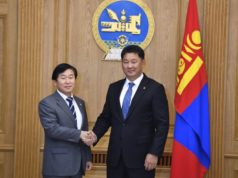Russian President Vladimir Putin has signed two new media laws. It has been announced on a government internet portal that the authorities will in future be able to impose heavy fines on the media for the distribution of alleged false news. Critics warned against censorship and restrictions on freedom of expression.
The first law criminalises false news which can endanger public safety or cause „massive unrest“. What is classified as a false report, the prosecutor can decide. If necessary, the media regulatory authority may order the deletion of news and impose fines of up to 1.5 million rubles, equivalent to 20,500 euros.
A second law provides for fines for the publication of materials that express disrespect for the state, its symbols or governmental organs. Repeaters may face a prison sentence of 15 days.
The trigger for the law was an explosion in the city of Magnitogorsk, where dozens of people died earlier this year. While officially speaking of a gas explosion, independent media reported that it was a terrorist attack.
Amnesty International criticized the laws. Other human rights organizations have been complaining for years about an increasing restriction of freedoms in Russia. At present, Parliament is advising on a law on a stand-alone Internet. With an autonomous infrastructure Russia wants to be independent from the worldwide network. Recently, thousands of people in Moscow protested against the plans. They fear censorship of the Internet.



